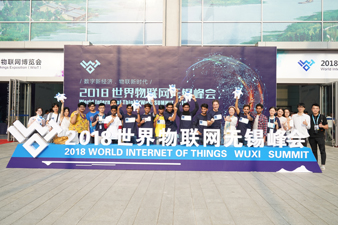Memsic senses a smarter future on the way, grows to meet rising demand
They may not seem like exciting or glamorous products, but without them, your GPS would be lost, your outside light would never turn on, and your smart watch would have no idea how far you have run.
Sensor technology is the key to the internet of things revolution taking place in China, acting as the eyes and ears of millions of new smart devices flooding into the market.
One of the companies making this revolution possible is sensor manufacturer Memsic Semiconductor Co Ltd.
"Sensors are vital to the development of IoT," Liu Haidong, Memsic's vice-president of product development in Wuxi, told China Daily. "As the core of IoT, they can gather and analyze information for people to make decisions."
Based in the Wuxi High-Tech Industrial Development Zone, the nerve center of China's IoT industry, Memsic's advanced sensors are setting the stage for a new generation of IoT technology.
Memsic has become the first Chinese company to develop a mini anisotropy magnetic resistance sensor, the world's highest performing magnetic sensor used in a wide range of intelligent devices, from intelligent transportation systems to GPS devices.
AMR sensors' sensitivity is a game-changer, Liu said.
In intelligent transportation systems, for example, AMR sensors can detect whether a car has passed and how many cars have passed, and can also measure the size and speed of the car.
"According to these signals collected by sensors, traffic flows can be calculated, and then traffic lights can be controlled,” Liu said, adding that intelligent traffic lights adopting this technology have been put into use on many of Wuxi's crossroads.
In addition, AMR sensors' ability to measure power consumption means that they can be used to conserve power in computers or motors, and their accuracy will be key to the development of new mobile terminals and wearable devices.
Memsic's research and development of micro-electromechanical systems and system integration technology is also likely to lead to the creation of a huge range of new small and low-cost products used in fields like electronics, industrial automation and aviation.
Sensors are becoming big business in China. The sensing components market grew 20.9 percent annually since 2011 to reach 54.7 billion yuan ($8.1 billion) in business revenue in 2015, said Wen Xueli, director general of the China Electronic Components Association.
Currently about 80 percent of China's sensing components are imported.
CECA predicts that fast-emerging homegrown companies led by Memsic will grab a greater market share of around 30 percent by 2020.
Memsic recently shipped its billionth sensor and the company is confident that its 15 years of experience and advanced technology has positioned it well to remain at the cutting edge of the industry to take advantage of these opportunities.
"Sensors will play a pivotal role in the IoT application field, providing a more intelligent life for human beings, with the development of smart homes, intelligent lighting, medical care and agriculture," Liu said.

 Play
Play